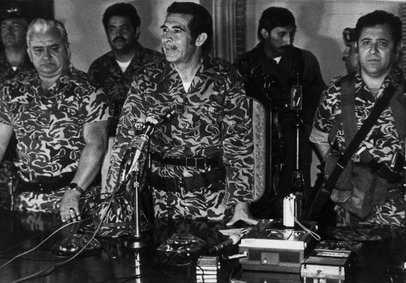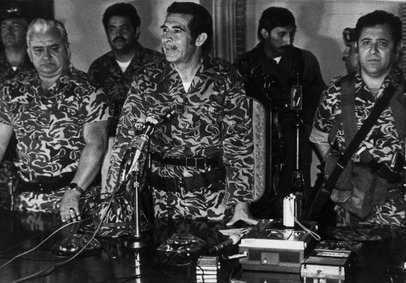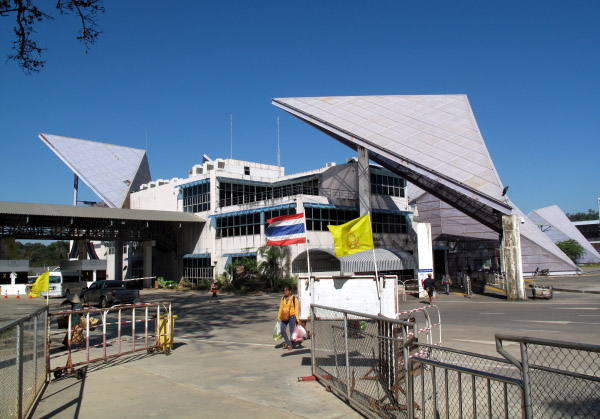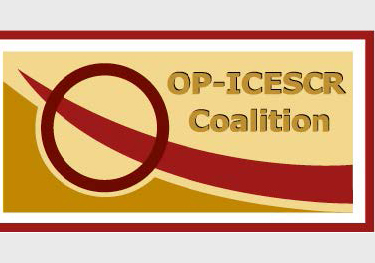
May 10, 2013 | News
La CIJ celebra que el proceso contra el General Efraín Rios Montt (center on the photo) por Genocidio y Delitos contra los Deberes de Humanidad haya concluido el viernes 10 de mayo en la ciudad de Guatemala.
La CIJ observó el debate por medio del abogado Miguel Moerth y apoyó proceso y el debido cumplimiento del Derecho Internacional de los Derechos Humanos y del Derecho Internacional Humanitario por medio del peritaje presentado por el Director de su oficina para Centroamérica.
Dicha oficina se ha mantenido atenta y ha abogado por el derecho de las víctimas a la verdad y la justicia.
Durante el proceso la CIJ llamó la atención sobre el uso abusivo de la figura del amparo, recusaciones, incidentes y otros recursos presentados por la defensa que pretendieron en diferentes momentos anular u obstaculizar el desarrollo del juicio.
La CIJ respalda decididamente al Tribunal de Mayor Riesgo “A” por haber llevado a cabo su difícil tarea, con respeto a las normas del debido proceso y la garantía del derecho de defensa de los acusados y, por haber resistido con las presiones recibidas durante el juicio, que incluyeron amenazas contra integridad personal de miembros del Tribunal.
La CIJ considera que el derecho de las víctimas a un juicio justo e imparcial y a conocer la verdad de los hechos, ha sido respetado con las acciones llevadas a cabo durante el juicio por dicho Tribunal.
Wilder Tayler, Secretario General de la Comisión Internacional de Juristas expresó: “Celebramos este triunfo de la Justicia sobre la Impunidad. Después de 30 años y de tanto esfuerzo, el derecho a la justicia de las víctimas ha sido respetado; la sociedad guatemalteca ha dado un primer y muy importante paso en el camino hacia la reconciliación. Esta sentencia fortalece el Sistema de Justicia en Guatemala y constituye un importante precedente para evitar que crímenes tan graves puedan repetirse. Constituye igualmente un ejemplo para toda la región americana en su combate contra la impunidad”.
Photo: Bettman/Corbias

May 10, 2013 | Comunicados de prensa, Noticias
La CIJ celebra que el proceso contra el General Efraín Rios Montt (centro de la foto) por Genocidio y Delitos contra los Deberes de Humanidad haya concluido el viernes 10 de mayo en la ciudad de Guatemala.
La CIJ observó el debate por medio del abogado Miguel Moerth y apoyó proceso y el debido cumplimiento del Derecho Internacional de los Derechos Humanos y del Derecho Internacional Humanitario por medio del peritaje presentado por el Director de su oficina para Centroamérica.
Dicha oficina se ha mantenido atenta y ha abogado por el derecho de las víctimas a la verdad y la justicia.
Durante el proceso la CIJ llamó la atención sobre el uso abusivo de la figura del amparo, recusaciones, incidentes y otros recursos presentados por la defensa que pretendieron en diferentes momentos anular u obstaculizar el desarrollo del juicio.
La CIJ respalda decididamente al Tribunal de Mayor Riesgo “A” por haber llevado a cabo su difícil tarea, con respeto a las normas del debido proceso y la garantía del derecho de defensa de los acusados y, por haber resistido con las presiones recibidas durante el juicio, que incluyeron amenazas contra integridad personal de miembros del Tribunal.
La CIJ considera que el derecho de las víctimas a un juicio justo e imparcial y a conocer la verdad de los hechos, ha sido respetado con las acciones llevadas a cabo durante el juicio por dicho Tribunal.
Wilder Tayler, Secretario General de la Comisión Internacional de Juristas expresó: “Celebramos este triunfo de la Justicia sobre la Impunidad. Después de 30 años y de tanto esfuerzo, el derecho a la justicia de las víctimas ha sido respetado; la sociedad guatemalteca ha dado un primer y muy importante paso en el camino hacia la reconciliación. Esta sentencia fortalece el Sistema de Justicia en Guatemala y constituye un importante precedente para evitar que crímenes tan graves puedan repetirse. Constituye igualmente un ejemplo para toda la región americana en su combate contra la impunidad”.
Foto: Bettman/Corbias

May 7, 2013 | Advocacy, Legal submissions
The ICJ today submitted to the United Nations a written statement concerning corporate complicity in human rights abuses and access to justice for victims of such abuses.
The statement is made ahead of the UN Human Rights Council’s 23rd session (27 May to 14 June 2013) and comments on a report of the Council’s Working Group on human rights and transnational corporations and other business enterprises.
Setting out issues concerning obstacles to justice for victims of human rights abuses by business enterprises, the ICJ calls on the Working Group to take various steps to address such issues, including by:
- Exploring the further development of international standards;
- Raising specific allegations of corporate abuse with relevant State authorities and business enterprises; and
- Addressing more clearly the issue of access to justice in cases of corporate complicity.
HRC23-Item3-WGBHR-WrittenStatement-LegalSubmission-2013 (download statement in PDF)

May 5, 2013 | News, Op-eds
An opinion piece by Benjamin Zawacki, Senior Legal Adviser for Southeast Asia at the International Commission of Jurists.
Thailand’s government recently passed up an opportunity for a new approach to the deep South, by declining to replace the Emergency Decree, which violates international standards on human rights, with the somewhat less heavy-handed Internal Security Act (ISA).
Equally concerning is why the government has not looked beyond the South in reconsidering the use of its other extraordinary security legislation: no fewer than 31 of Thailand’s 77 provinces are at least partially under Martial Law.
International law is clear that the extraordinary powers under security laws like the Emergency Decree and Martial Law may only be invoked under a strict set of circumstances, none of which is even arguably applicable in Thailand outside of the southern insurgency (four of the 31 provinces).
Martial Law may be invoked in Thailand “when a situation arises that makes it necessary to maintain law and order and to defend against the danger of attack”, or “when there is an outbreak of war or unrest”. All of Thailand’s provinces that are situated on one of the country’s four international borders are under Martial Law in whole or in part (including the 27 not in the deep South). Among them is Phitsanulok, whose shared border with Laos is roughly only 50km.
This province featured in Thailand’s last war, a three-month affair with Laos that ended in 1988.
Otherwise, Thailand’s border challenges are well-known: trafficking in persons, drugs, and weapons; landmines; refugees and migrants; smuggling of logs, oil, and other contraband; demarcation disputes. While doubtless all of these call for robust law enforcement, only the dispute with Cambodia over the Preah Vihear temple even arguably involves defending against the danger of armed attack.
Several minor but deadly skirmishes with Cambodian forces, as well as considerable mutual saber-rattling, have occurred in several districts of Si Sa Ket province since 2009. It is not credible to claim that Thailand needs to impose Martial Law because of external threats.
A more likely explanation is that Martial Law’s expansive application in Thailand is due to what is common to most security legislation around the region, namely vague language that lends itself to broad interpretation and granting wide powers to the military.
The Martial Law term “law and order”, in addition to more typically applying to civilian law enforcement agencies than to the military, could apply to any situation in which a law is implicated – which is nearly all situations. “Order” and “unrest” are particularly ill-defined.
Moreover, “maintain” suggests law and order need only be threatened to invoke Martial Law, rather than be lost and in need of being restored.
What constitutes an “attack” and the likelihood of such required for Thailand to be in “danger” are also essentially judgment calls. And when is an attack (or a series of attacks) tantamount to an “outbreak of war”?
A second and related reason that Martial Law is so pervasive in Thailand is the large number of military personnel empowered to invoke the law, coupled with, inversely, the difficulty in revoking it later.
While order by royal decree is required for invoking Martial Law on the first set of grounds, even local military commanders can invoke Martial Law in the area under their control on the second set (“when there is an outbreak of war or unrest”), affording them enormous discretion and authority.
In contrast, any and all revocations of the law require order by royal decree, a level of involvement as centralized and bureaucratic as a district military commander’s invocation is local and simple.
Martial Law’s use in Thailand historically supports the analysis that imprecise grounds combined with bureaucratic inertia account for the wide geographical application of the law.
Twice in the past 22 years, orders by royal decree referencing “law and order” have imposed Martial Law on the whole of Thailand, both times via coups d’état in 1991 and 2006.
On only three occasions after the 1991 coup (twice later the same year and once in 1998) was Martial Law lifted in some but not all of Thailand’s provinces. On the eve of the 2006 coup, it was still in effect in all or part of 18 provinces.
Similarly, following the blanket invocation of Martial Law on the whole country in 2006, on only two occasions since (in January 2007 and 2008, respectively) has an order by royal decree revoked the law in 46 of Thailand’s 77 provinces. Why not everywhere?
International law requires that extraordinary security legislation be invoked only in response to an exceptional situation.
Powers granted to security forces and any derogation from human rights must be strictly necessary and proportionate to the situation, and must have a time limitation attached to them.
None of these elements is met in the case of Thailand’s application of Martial Law to its international borders.
Indeed, Martial Law in Thailand allows security forces to arrest people without a warrant, and to detain them for seven days prior to charging them.
Critically, it does not require that detainees be promptly brought before a judge, in flagrant violation of Thailand’s legal obligations under the International Covenant on Civil and Political Rights (ICCPR).
This leaves detainees particularly vulnerable to torture or other ill-treatment at the hands of the security forces, which Thailand has also agreed to prevent and punish as a party to the ICCPR and the Convention against Torture.
In cases under Martial Law of alleged misconduct by security forces, victims are unable to institute a criminal prosecution (though they may initiate a civil action) or to choose their own lawyer; only a military prosecutor is entitled to institute a criminal charge. No appeal can be lodged against judgments or orders of military courts during this period.
The Thai government should reconsider its decision to keep the Emergency Decree in place throughout most of the deep South.
At the same time, it should take the long overdue step of lifting an equally heavy-handed Martial Law everywhere else.

May 3, 2013 | Multimedia items, News, Video clips
The ICJ warmly welcomes the entry into force of the Optional Protocol to the ICESCR that will be effective on Sunday, 5 May, 2013.
As noted in previous statements, the ICJ considers that the entry into force of the new instrument allowing the review of alleged violations of economic, social and cultural rights by a UN Committee will mark an historic boost to the international protection of these rights.
The ICJ and its allies in the International NGO Coalition for the OP-ICESCR look forward to pursuing the dialogue and interaction with the UN Committee on Economic, Social and Cultural Rights and States parties, and aim to contribute at making the new procedures offered an effective tool for victims who could not achieve justice in their domestic justice systems.
Coalition press release in English
Coalition press release in Spanish









